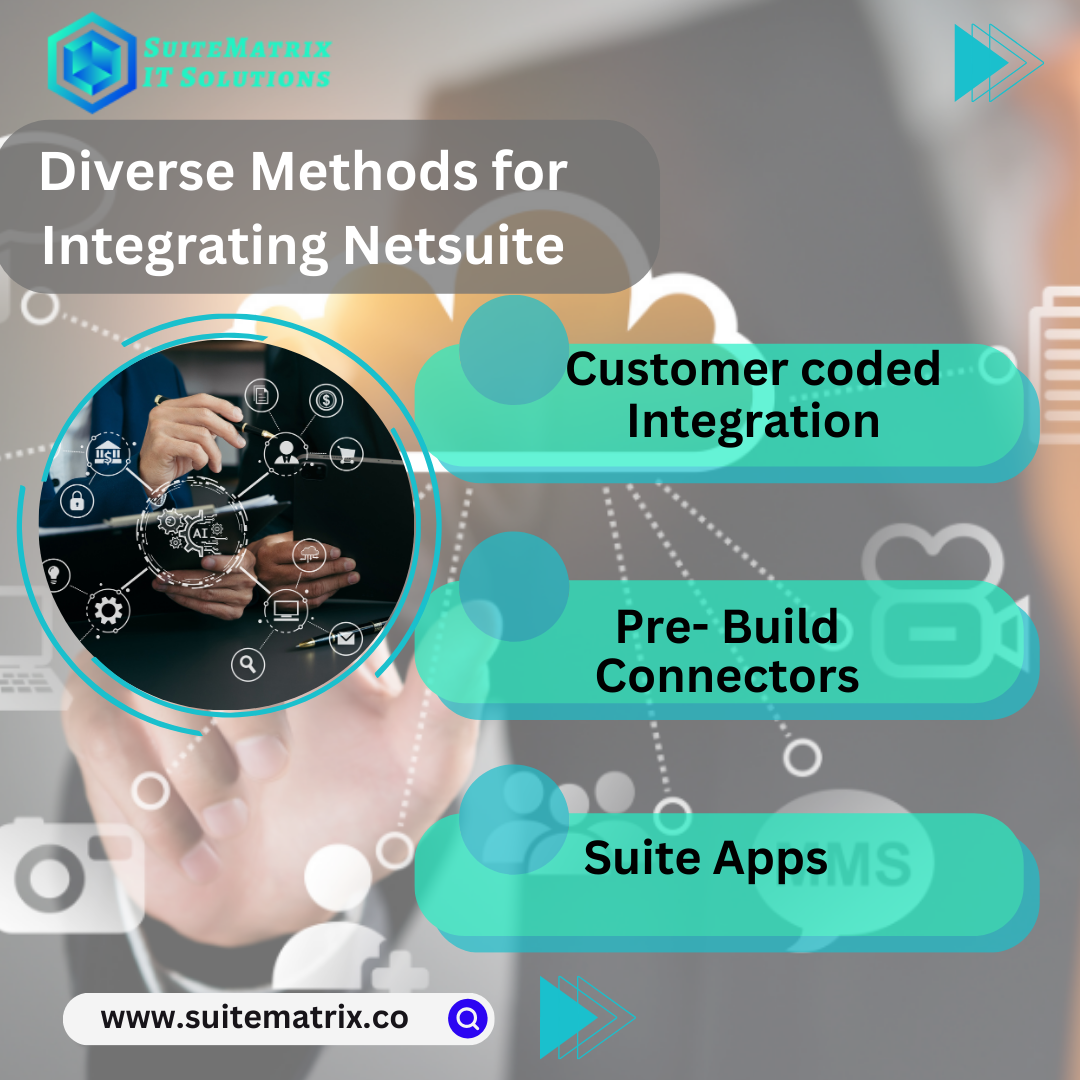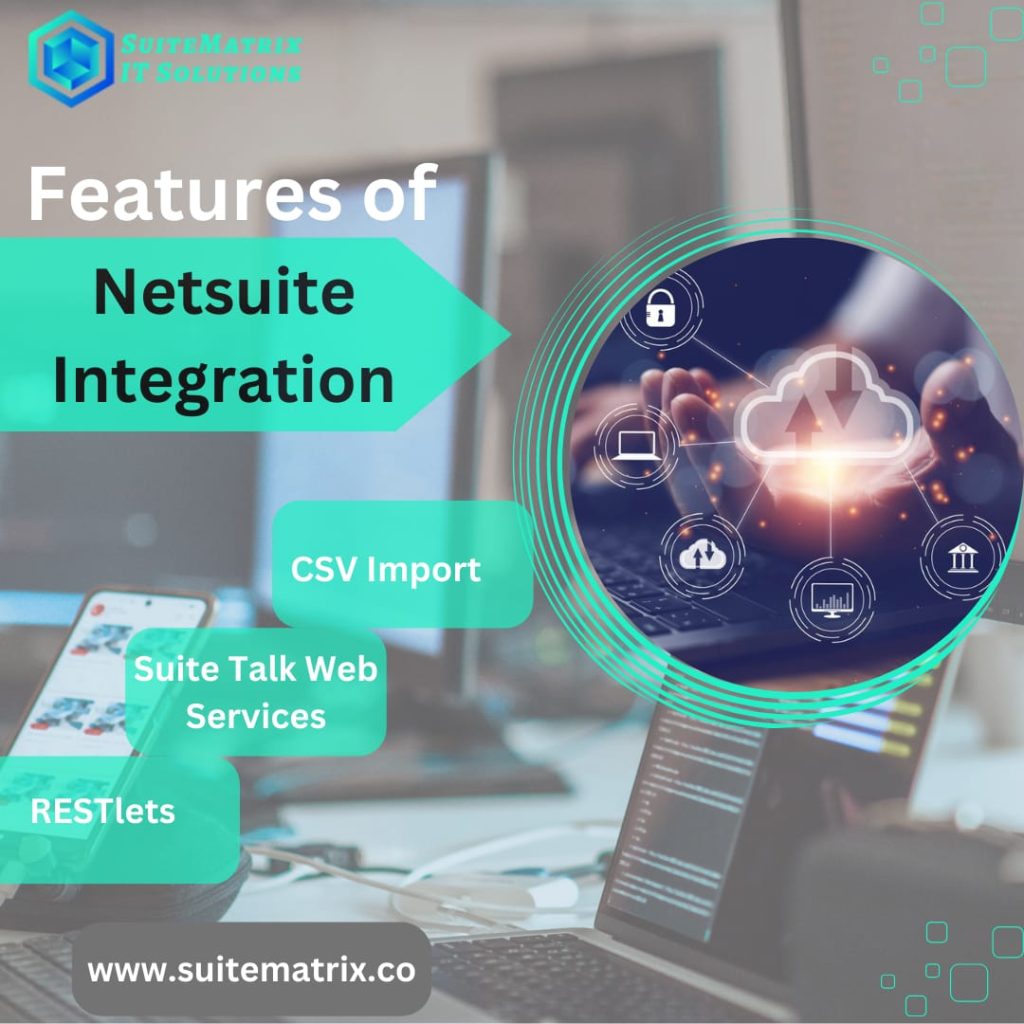NetSuite Integration
NetSuite integration is the process of connecting NetSuite with third-party software or applications. It facilitates the seamless flow of information between NetSuite and other programs. The process occurs automatically and efficiently. This way, NetSuite always has the latest data from other software, databases, or applications your business uses. NetSuite integration works by either building a custom connection from the ground up or taking advantage of pre-existing connections or integration platforms.
Benefits of NetSuite Integration
Here are some reasons for your business to explore NetSuite integrations.
- Improved efficiency: Integration allows for the automation of manual processes, resulting in more efficient and accurate data management.
- Enhanced data accuracy: By integrating NetSuite with other systems, you can eliminate the need for manual data entry and reduce the risk of errors.
- Better decision-making: With integrated systems, you can access real-time data from multiple sources, allowing you to make more informed business decisions.
- Increased productivity: Integration can free up time and resources that would otherwise be spent on manual tasks, allowing employees to focus on higher-value work.
- Enhanced customer experience: With integrated systems, you can provide a seamless experience for customers by having access to all relevant customer data in one place.
- Improved collaboration: NetSuite e-commerce integration, for instance, allows different teams and departments to access and share data in real-time, improving collaboration and communication.
Diverse methods for Integrating NetSuite

- Custom-coded NetSuite Integration
The first NetSuite integration option is to use NetSuite’s API, including SuiteScript and SuiteCloud.
- SuiteCloud
Suitecloud is a NetSuite platform that allows users to integrate data between cloud and on-premises applications safely. Designed to support direct-to-API integrations or existing middleware products, SuiteCloud provides a secure way to connect NetSuite to virtually any third-party application. It uses REST and SOAP web services–both industry-standard integration technologies. SuiteCloud handles data transfer and connections.
- SuiteScript
SuiteScript enables developers to customize NetSuite’s interface and automation processes, such as scheduling calls on overdue accounts, automatically re-assigning leads when they’ve gone cold or even sending out marketing emails.
2. Pre-builtNetSuite Connectors
Pre-built NetSuite connectors are by far the easiest option. These are solutions designed to integrate NetSuite with other platforms and, in most cases, can be configured in just minutes rather than weeks. Regarding pre-built NetSuite connectors, we have two main options: going directly through NetSuite or finding a third-party provider.
3. NetSuite’s SuiteApps
NetSuite provides its own library of NetSuite integration connectors in an online marketplace called SuiteApps. While SuiteApps make it easy to integrate other platforms, they aren’t always the best solution. The downside of SuiteApps is that they aren’t very customizable, and there might not be a SuiteApps connector for all the platforms.
Netsuite Intergration Features

- CSV Import
Comma-separated value (CSV) import is the most used method for transferring small to medium-sized data sets from other applications into NetSuite. This process saves time and prevents errors by submitting data in a CSV file. This data can add or update many records at one time, avoiding the need for manual data entry. The import process can be saved, reused later, and shared with other users.
2. SuiteTalk Web Services
- SOAP web services
It provides programmatic access to NetSuite data and business processes through a SOAP-based services API. For large or ongoing data migration projects and migrating data for record types not currently supported for CSV import, use SOAP web services.
- REST Web Services
The NetSuite REST web services provide an integration channel that extends the capabilities of SuiteTalk. They provide a REST-based interface for interacting with NetSuite. The main benefits of REST web services are access to metadata records, including user and company-specific metadata, effective handling of custom records and custom fields, and easy-to-understand API navigation. In contrast to RESTlets, you do not need to write, deploy, and run custom scripts.
3. RESTlets
RESTful integration supports stateless communication between client and server. RESTlets offer ease of adoption for developers familiar with SuiteScript. It uses a secure, lightweight, script-based approach with standard JSON-formatted data.
Conclusion
As a NetSuite solution provider, SuiteMatrix offers a robust solution for NetSuite integration, streamlining processes and enhancing overall efficiency. Its comprehensive suite of tools empowers businesses to seamlessly connect and synchronize data, leading to improved collaboration, reduced errors, and increased productivity.
As organizations embrace digital transformation, we prove to be a valuable asset in optimizing NetSuite integration for a more connected and agile business ecosystem. By leveraging the capabilities of NetSuite in conjunction with your current infrastructure, you open doors to a range of possibilities that can elevate your organization to new levels of success.

Great article on navigating the potential of NetSuite integration. I really appreciated how you explained SuiteCloud and SuiteScript, showing the variety of solutions NetSuite offers for both custom and out-of-the-box integrations. Your insights on the benefits of integration, like improved efficiency and decision-making, resonated with me, especially the focus on eliminating manual work. The practical advice on using CSV imports, RESTful services, and pre-built connectors like SuiteApps was also extremely helpful. Thanks for such a comprehensive guide, it’s definitely boosted my confidence in integrating NetSuite into our operations. Looking forward to more of your insights.